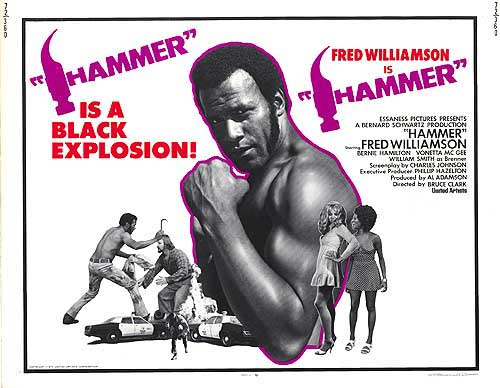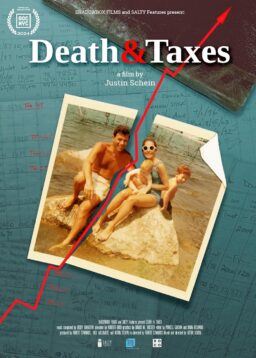Fred Williamson sits on the terrace of the Majestic Hotel, his shirt open to the waist, gold chains around his neck, a fine Havana cigar in his hand, preparing to sell his 18th movie at the Cannes Film Festival, and he thinks out loud: “Where are my boys singing doo-wop down on the corner? Where are the boys I started out with at Broadway and l7th in Gary, Ind., singing doo-wop? I wish they could check this out and see that I’m really doing this.”
He calls over a waiter and orders a gin and lemon and says that he has made 50 films altogether, and none of them has ever lost money. Now he is the most successful black entrepreneur in the movie industry. He writes, produces, directs, stars in and sells about three movies a year. “But if I stopped making money for them, they’ll forget me in a month,” he says.
Is this a lonely man?
Every third person who passes him stops to say hello. Beautiful women look covetously at him from across the room. Distributors say they’ll have the certified check ready by Monday. Fred Williamson is friends with everybody.
“My company is named Po Boy Productions,” he says. “I started it during the so-called boom in black pictures. That boom collapsed in the mid-1970s because the white studio chiefs didn’t think it was socially desirable to go to parties in Bel-Air and brag about how their most successful movie that year was ‘The Legend of Nigger Charley.’
“When the black boom collapsed, I was ready. I knew that black pictures were being thrown away in the world market. They’d sell the rights for $3,000. But black stars were big in Italy, France, Spain — even places you never think about, like Malta. So eight years ago I started selling my own pictures at the Cannes festival. You could say I’m doing all right. I deal with the same buyers every year. I get $100,000 for Italy, $125,000 for France. I pay my bills.”
The movies have names like “The New Barbarians” “Rome 2072,” “Vigilante,” “The Bronx Warriors,” “The Last Fight,” “The Big Score” and “Three the Hard Way.” Williamson makes them for less than a million dollars.
Worldwide, they’ll do $10 million, half in the United States.
“I’ve never had the money to do a picture the way I’d really like to,” he says. “They want all the action and special effects of ‘Raiders of the Lost Ark‘ for 10 percent of the budget.”
Are you headquartered in Los Angeles? I asked.
“Headquartered?” He smiled and rotated his cigar. “I have a condo in Santa Monica and an apartment in Rome. Po Boy Productions is a telephone, a calculator, a typewriter and a dog named Hammer. I don’t even have an agent. I sold my house in LA because I was never there and I didn’t have anyone to bring in the mail. I live in hotel rooms. I love room service. I’m a real lone wolf.”
You don’t have anyone to bring in the mail? I asked.
“I don’t have any really close friends. No men friends. I have several girlfriends who would do anything for me. But my relationships with men always become competitive. It’s a challenge. Who needs it? I keep to myself. And I chase girls. As I grow older, the girls get younger. I like company that’s fast on its feet. Chasing women keeps me young, vibrating and with the creases in my trousers pressed. When I played football I weighed 222. Now I’m down to 220. A sex symbol has to be lean.”
Williamson played pro football for nine years. Before that, he played for Northwestern, which he attended on an athletic scholarship. He graduated second in his class in high school in Gary and chose Northwestern over collegiate football factories because NU was stronger academically. He has his masters and Ph.D. in architecture and is a registered architect.
“When I was playing pro ball, I’d work as an architect the rest of the year. After I left football, I designed buildings for nine months and I was going crazy at a desk. I was watching television and I said to myself, ‘I can do that.’ I called the gate at Twentieth Century-Fox, left my name, drove onto the lot, went to see the man who was producing the ‘Julia’ series with Diahann Carroll, and wound up getting a job as Julia’s boyfriend for a season. Then I was in ‘M*A*S*H‘ and ‘Tell Me That You Love Me, Junie Moon,’ and I was an actor.
“Today, what I do that’s unique is I make a movie and sell it to the rest of the world. That’s my angle. If I do a picture in the States, I reserve the world rights and bring it to Cannes and sell it to all the buyers from the European, African and Asian markets. My office is the terrace of the Carlton Hotel. I use standard contracts, People know my word is good.”
But from what you say, I said, you sound sort of lonely. And you make your accomplishments sound hollow.
“If I make money for them, they love me,” he said. “If I don’t, they don’t. You’re only as good as your last game. I know that from my days as a jock. My parents still live in Gary. I can’t get them to move, so I keep putting additions on their house. They’d be happier if I was a doctor, lawyer, architect. This acting doesn’t seem real enough to them.
“But I like the life. I don’t mind being a loner. But if I took all this and burned it up and started all over again, I’d have to say my happiest moments were standing on the street corner, singing doo-wops.”












